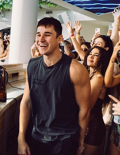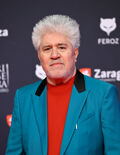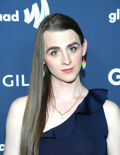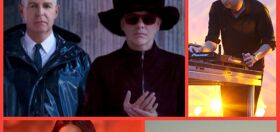 WorldPride hits New York this weekend, and I’ve dreaded it for months.
WorldPride hits New York this weekend, and I’ve dreaded it for months.
The dread began this year when I got a Scruff message from a man in Spain. “Visiting New York in June,” he wrote to me—in January. The men coming to town were anxious to nail down plans, to go to the best events, to have the wildest time. The pressure of pride is already intense; WorldPride would be worse.
Pride isn’t just a celebration of identity and a shared journey, though that’s the best part. It’s also a mess of social events and, at parties and on dating and hook-up apps, an intense sexual competition. I get queasy when I think about that concentrated mass of gay men, their eyes appraising my worth versus the worth of the guy next to me.
That’s part of every pride of course, but this year’s branded mega-event will bring more travelers than ever—to say nothing of the hot, rich, famous travelers. Social media superstars will arrive in force to cap off weeks of city-hopping between celebrations, a glamorous late June mini-circuit where they chase an endless pride. I know Instagram isn’t real life, but those people still provide ego foils for me. I’ve felt intense pain over the thought that I wouldn’t do as much, have as much fun, be as attractive, as successful, as wanted.
How about we take this to the next level?
Our newsletter is like a refreshing cocktail (or mocktail) of LGBTQ+ entertainment and pop culture, served up with a side of eye-candy.
Each year in the months leading up to pride, I become driven—desperate, really—to improve how I look. I work out and miss workouts, diet and break diets. And until pride hits, I feel steady anger at myself that I only release in a final admission of defeat: “Time’s up! No getting better now.”
At some point when I was younger, I internalized the idea that gay men desired and rewarded only two things: wealth and looks. But I wasn’t from money or heading toward it, and the genetic lottery didn’t spit me out with the code for effortless beauty. The way to feel valued, I believed, would be to work to get a body men would desire.
Objectively—say, if I saw a ten-year before-and-after comparison—I’d have to admit I’ve had success in changing my body. It took thousands of hours of working out and dieting (and chicken and broccoli, though I’ve mostly replaced that with Filipino chicken adobo and . . . asparagus). Many gay men put enough time into this that, especially in the pre-summer months, it becomes practically a second career.

But when I see pictures of myself, I don’t feel pride. I feel shame, anger, and self-hate. I see nothing but flaws. I see myself as small, never lean enough, weirdly proportioned, narrow-shouldered, and backsliding from my “best” shape instead of making constant progress.
When someone compliments an Instagram thirst trap, I chalk it up to the power of angles and lighting or even dissociate from it entirely. My brain only sees the not-good-enough, and because of that, can only imagine rejection.
It affects my daily life and my relationship. Recently, my partner decided to take weekly progress pictures for his own fitness journey. (We reinforce each other, I’ll admit, in both good and bad ways.) I decided I’d join in, but after he snapped a few pics of me in undies and neutral lighting, he awkwardly avoided showing me.
I was irritated. “I look that bad?” I said.
“No, you look great,” he said. “But sometimes you see a picture of yourself and no matter what you look like, it ruins your day.”
He was right: Seeing a photo of myself has sent me into a depressed spiral too many times. To be fully honest, seeing pictures of myself has made me want to die.
This topic is unsexy, to be sure. And because of my relative privilege—I’m cis and white—it might earn eye-rolls from people who view it as whining. I suspect that many guys believe, as I did, that at a certain level of sanctioned, masculine attractiveness you magically must become a chill jock, confident and happy enough to show up to pride and own any party you go to. The self-hating part of me believes that’s true and that I just have to keep working to reach it, or that maybe I can’t because of insurmountable physical defects. Thankfully, there’s another part.
Not everyone struggles with this the same way. Last year, at a big pride party for the first time, my boyfriend had an epiphany seeing all the beautiful influencers in real life. His epiphany: They weren’t that beautiful. They weren’t that ripped. Not the unreachable, brain-wrecking way they appear online. They were people, not gods. And not only that: they were just as scared as he was, looking around nervously, hungry for validation.
It became suddenly obvious that they, too, had hoped their worked-out bodies would shield against the pain of judgment and rejection.
Perhaps more to the point, these were media- and Instagram-enforced standards of beauty. They influence who we find beautiful, but don’t determine it.
When he realized that, my boyfriend feel a lot better. But I spent the same pride party extremely anxious, drinking to try to get past it. I left feeling despondent, convinced that everyone there had seen through and rejected me, decided I wasn’t good enough.
Now, I’m not a mental health professional, and I don’t have a tidy lesson or positivity-bot takeaway. I only just started seeing a therapist who pushes me to think and talk more—trigger warning: cornball language—about validation, self-talk, and authenticity. I’m acknowledging for the first time that I don’t have to be stuck in this cycle, that it’s not gay destiny. But my small epiphanies don’t always stick. I have to re-absorb over and over. I backslide, even if I also make progress.
Related: Casey Spooner is over the commercialization of pride
Here’s one lesson I struggle to re-absorb: I didn’t invent my self-hate spontaneously as a reaction to other queer people or to pride. I was taught to self-hate when I was young. A conservative Christian upbringing, it turns out, can be a brutally effective teacher of gay boys. Even if you weren’t raised that way, the larger culture still works to grind LGBTQ people down from an early age. You can grow up to embrace your sexual or gender identity but still feel a powerful residual self-hate.
I don’t know of a quick fix for myself—I wish I did. Labels or diagnoses without thoughtful, patient professional help and community support are not enough. But I’m certain that I would’ve appreciated hearing that other gay men felt this way, instead of struggling in silence. As much as I could’ve used their advice, I needed their honesty and understanding even more. So if you feel the same pain this pride, this is for you.
You’re not alone.
If you’re thinking about suicide, please call the Suicide Prevention Lifeline at 1-800-273-8255
Photos by Hunter Weber























LostMyClothesAgain
Yet another Queerty article about psychologically messed up gays. Based on this site one would believe that 90% of gays are train wrecks. I would imagine that the majority of the LGBTetc community is not “obsessed” with Pride and hooking up with out-of-towners.
epicdizzle
Lol; you’re not super familiar with our people, are you? It’s probably closer to 98%.
JPDonahue
And… Yet another Queerty Comments Troll. You never disappoint!
Catholicslutbox
Who is Joel and where can I see his nudes?
Brian
So don’t go to Pride or any events associated with it. Problem solved.
LostMyClothesAgain
Go get another Madonna tattoo. You need to calm down.
Brian
Sick burn bro.
epicdizzle
Asanine comments aside, this made me feel seen. It may be easy for some to just disassociate from the community, and the self-hatred society breeds into us, but from another who struggles with that–the feeling like you should just die because you are less-than–thanks for the reminder.
Kenover
Boo hoo hoo. Clearly the problem is you, not Pride. Your values are all screwed up—putting money, looks, youth ahead of wisdom, generosity, intelligence, kindness. For those of us who’ve lived through much harder and darker times, your anxiety and anguish over Pride just sound like selfish whining. End this pity party and get a life.
TDQ
Youre Cute, Handsome, but want to be perfect.
You have a Boyfriend but choose also to be on Scruff.
Apps like that are effectively a ratings system. If you feel that system is not for you, get off it!
You`ve got a guy at home, why chase the next one when it devalues you?
I’ve never thought I was particularly attractive, and truthfully since I hit 30 (20 years ago) I haven’t cared a bit. I`m married to a very hot and adorable man 14 years younger than me, and so its all ok.
But I do see your side daily from my teenage daughter, who cannot get off Instagram, or ever feel good about any photo taken of her until she tweaks it… Stay with the counselling, listen and practise. Get better, cos you already have more than most, you just dont get it yet.
LostMyClothesAgain
Exactly !
Chrisk
An interesting article and lets be honest. Very truthful for a high % of gay men. Go to any gay themed party and it’s high school all over again.
Honestly when I was younger I had allot of those same insecurities. I hated the way I looked too. My whole self worth was wrapped up in it. Looking back I had body Dismorphia. Luckily I eventually grew up and just grew out of it which is lucky because wait till age sets in. Grey hair and wrinkles aren’t exactly sought after so you better get over it quick. Lol
Black Pegasus
I commend the writer for recognizing his own narcissistic pursuits and the dysfunction that lays within. He also admitted that he has privilege as a “cis white male.”
His acknowledgement of such things takes the sting out of any blow I intended to land. The lesson here? We gay men are seriously f**cked up! Even while living our best lives we continue to suffer! We tear each other down! We seem incapable of being psychologically balanced and free from the bullshtt. I unplugged from social media years ago because I recognized the intrinsic trap many studies have already confirmed. Instagram is driven by desire, envy and outrage. If you don’t want those things in your life, walk away from it!
Kangol2
I appreciated this entry, even though my own experience has been quite different, but I did not see any mention of the writer’s engagement with psychological services–a therapist, psychologist, psychological counselor, etc.–which could probably benefit him tremendously. New York has a number of LGBTQ and LGBTQ-friend psychological and counseling options, most of which are covered under health plans out there (private ones and the ACA), so in addition to all the gym work and great eating, perhaps consider speaking with a counselor, who can help address some of the challenges and deeper issues that the writer, like so many people, not just LGBTQ, face on a daily basis.
imperator
You must have skimmed over it because he mentioned a therapist, which is to his credit— I think we could all use a little trained counseling from time to time because never mind being gay, just living in this society is enough to give anybody issues. Consider the most basic impact on our self-esteem and anxiety when capitalism would happily watch us starve to death in the gutter if we aren’t “sufficiently productive” to merit survival, despite how plentiful the necessities are. Food & shelter are abundant but go in the trash and sit empty because hungry and homeless people aren’t doing jobs “good enough” to pay for them, even if they’re in demand. Everyone living within that paradigm has to subsume some level of neurosis in order to function.
And as if it isn’t bad enough that we swim in a deep ocean of stressors and maladaptation, then when someone has the self-awareness to publicly say “this is how I’m kind of a mess but I’m working on it, and others might appreciate knowing they aren’t struggling alone,” they’re descended upon by a bunch of vicious egotists snarling “get over it” or “become a recluse, then” and boasting about how much better adjusted they are. As though such grandiosity, and lashing out, and compulsive affirmation-seeking (otherwise why respond at all?) aren’t all signs of their own issues, trying to convince everyone *they’ve* got *their* shit together.
Throw a Pride party exclusively for people with their shit 100% together and locked down, and it’ll be attended entirely by liars, delusionals, and psychopaths.
CenterRight
There is something seriously wrong with this guy and even his therapist can’t fix it. He is reasonably handsome and attractive but he is not content with what he is bestowed with. He has a boyfriend and live in a first class city in the US. He has food, a place of his own, good friends, and probably a decent job. People like you and most of us here, we don’t have rights to be unhappy. We really don’t.
Cam
The right wing anti-LGBTQ troll account tries to stealthily stick in a “Gays have no right to be unhappy” comment.
Try again.
poundmetoo
Maybe he’s just not as hot as he thinks he is??? Or maybe it’s his balding head that’s the problem?
Cam
Maybe you and your boyfriend should take a trip out of the city for the week and not worry about it so much.
Jared MacBride
1000% correct, but this guy doesn’t seem like one who’ll pass up an opportunity to worry.
mmoore
The second last paragraph is key – everyone has issues they are dealing with, and it helps to know you are not alone. Why anyone feels the need to dump on people who admit to such struggles is beyond me.
On a side note, did no one else notice that the pride flag is upside down?
Rhonetta
I lived in Chelsea for 7 years and this is exactly the type of gay who would never give me the time of day because I didn’t live up to certain physical gay standards, and yet, here he is whining about not looking hot enough for Instagram or Scruff. But you know what? Those types of ignores never bothered me then, and they don’t bother me now, because I value many other things in life, mainly my own self worth.
I hope the author continues to work through his issues in therapy and comes to realize that while muscles and filters may get you instant gratification, that gratification fades right about the time your hookup is telling you he has to be up early tomorrow.
Also, get off Instagram and the gay dating apps!! You have a partner. Find validation from within, not from the number of likes a shirtless photo will get you. Maybe then you’ll start to enjoy Pride as it’s meant to be enjoyed.
Heywood Jablowme
I wish I had $1 for every article like this I’ve read since, oh, about 1980. I’d definitely have a down payment for a condo in Provincetown (if I really wanted to live there, which I probably wouldn’t).
But I seriously Don’t Get It.
Guys like him go on and on about how they “internalize” “media- and Instagram-enforced standards of beauty.” Okay, at least he’s aware that’s the mistake he’s making! But does he really have no authentic sexual desires of his own? To give a minor example, I’ve always found short, skinny, nerdy guys to be very HOT. I always realized, of course, this is not the norm in gay life. I don’t know (or particularly care) how or why this quirk originated, but I’ve always enjoyed it (they did too, lol), and I’ve always appreciated it as part of my authentic but totally ordinary gay nature.
Everyone is different, so run with that.
Worse, guys like this seem to have no gay male, NON-sexual friends. I suspect he has hardly any gay friends who he hasn’t had sex with. Yes, he doesn’t say that in so many words, so I’m reading between the lines with that. But that seems to be a common thread in ALL these laments about How Horrible Gay Life Is. Despite the fact that I’m an introvert and a withdrawn, somewhat anti-social person, I’ve never had any trouble finding gay male, non-sexual friends. That’s the easy part! None of my long-time friends ever fit anyone’s “societal” notion of A-List gays. (Not that I, or they, ever spent any time obsessing about that.)
His boyfriend sounds very patient! But the fact he actually has a boyfriend and is still hanging out on Scruff… yep, that’s part of the problem, in his case. This is not necessarily a judgmental observation. Maybe some guys could navigate those shark-infested waters, but he’s not one of them, and he’s even aware of that fact, and yet he’s still swimming out there. It’s not all about internal feelings and self-assessment; sometimes it’s about simply changing your behavior. He seems to understand this well enough with diet, for instance. He wouldn’t eat a big bag of potato chips every day and expect to stay fit. Similarly, you can’t obsess about “rejection” (i.e. sexual rejection) while arranging your entire life around social events and media that are pretty well guaranteed to produce a lot of rejection.
Also, I’ve never understood why anyone over the age of 9 or so takes religion seriously. That’s a sign of sheer lack of intelligence. 🙂
Tonka
I see you’re across the street from Most Holy Trinity. Perhaps someone can consul you.
Wolfie
Listen Kid. In the 70’s, 80’s, and 90’s we would stand in meat markets aka gay bars and be inspected head to toe before we could even get a hello EVERY WEEKEND (and some weekdays.) My advice is forget about yourself and go find an ugly guy with a big dick and shatter your walls.